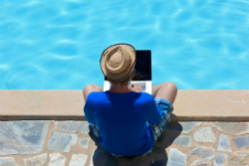Blog posts tagged out of office
Control your email while you’re on holiday
What on earth should you do with your email when you’re away on holiday? Switch off and face returning to a bulging inbox? Stay connected and risk not having a proper break? Delegate access to a colleague?
Each option has pros and cons. But there’s a constant factor: taking a holiday gives you a unique opportunity to clean out your inbox. Done properly, this will substantially reduce your holiday backlog.
 You should aim to leave an empty inbox and inoculate yourself from a severe attack of information overload on your return. Here’s what to do:
You should aim to leave an empty inbox and inoculate yourself from a severe attack of information overload on your return. Here’s what to do:
1. Use the week before
During the week leading up to your holiday, set time aside each day to spend clearing out your inbox.
Be absolutely ruthless. For example, delete multiple copies of the same email, retaining only the last message in the chain. Move emails that are no longer current into a folder. Flag emails that will need attention when you return.
2. Prioritise emails for when you return
Put newsletters, social media updates and so on in to a folder where they won’t be in the way when you return.
Remove yourself from all unnecessary email circulation lists, and flag up messages you need to deal with once you’re back.
3. Use rules and filters intelligently
Use automatic filters to de-prioritise unimportant emails and file messages automatically while you’re away.
For example, you can set up Outlook (or your preferred email client) to move all emails from Twitter, Facebook and LinkedIn into a specific folder. Or you can even delete them altogether.
4. Brief your colleagues
If you’ve decided to give a colleague access to your inbox while you’re away, take the time to give them a rundown of what is and isn’t important.
They need to know which messages to prioritise in your absence, and who they should reply to quickly.
5. Set a professional out of office message
Think about what to say in your out of office message. Do your customers really want to know that you’ve ‘jetted off for a week of sun and sangria’?
Make sure your out of office message doesn’t give away any sensitive information, either.
If you do decide to stay connected, stay disciplined and check your email only once or twice a day. And remember: all the evidence suggests that disconnecting is good for our health and wellbeing.
- Email overload is damaging productivity
- When it comes to email replies, is faster always better?
- How to sort out your email once and for all
Copyright © 2014 Monica Seeley, founder of Mesmo and a leading expert on email best practice.
Switching off from email in the always-on world

Put the smart phone away! (Image: Gulltaggen on Flickr)
With laptops, smartphones and other mobile devices, your email is always with you - wherever you are. So how can you get away from it without appearing rude to people who expect an instant response? Is it even realistic to always be available?
It's interesting that most surveys, including my own, show that we stay connected not so much because people expect us to be available but because we think they expect us to be available. That reflects either our inability to switch off and delegate, or an equally worrying 'email addiction'.
To check your level of email addiction use my email addiction tool.
The key to surviving in this 24/7/365 world of business is to manage people's expectations. Here are five ways to take time off from email:
- Check your level of email addiction to make sure your reluctance to switch off is not driven primarily by your own assumptions rather than other people's expectations. More on how to deal with addiction in a future column.
- Use your out of office message no matter whether you're away on business or holiday. Set a safe, simple message saying you are out of the office with limited email access. Offer a point of contact for urgent matters and a date when you will reply. Make this the day after you actually get back, so you have time to catch up.
- Ask someone else to manage your email whilst you take a break. If you're a one-person business or don't have someone you can ask, consider using a virtual PA service.
- Lock your smart phone away and take a conventional mobile phone with you which only handles voice and text messages.
- If you do take a smart phone or laptop with you, only check your email once or twice a day - preferably at the end of the day. At all other times, shut down your email software and turn new message notifications off.
We all like to think we are indispensible but at the end of the day most of us need time to recharge our batteries and switch off. Staying switched on around the clock has been shown to reduce our overall effectiveness - and never mind the health implications!
Be honest. Ask yourself if there's ever been an email which would cause a disaster if you didn't deal with it immediately. For most of us, the answer is no. And that means there are alternatives to always being connected.
For more ways to take time out without jeopardising your business and professional image either go to one of Dr Monica Seeley’s ninety minute Brilliant Email Master Classes or get a copy of her latest book, ‘Brilliant Email: How to improve productivity and save time’.



